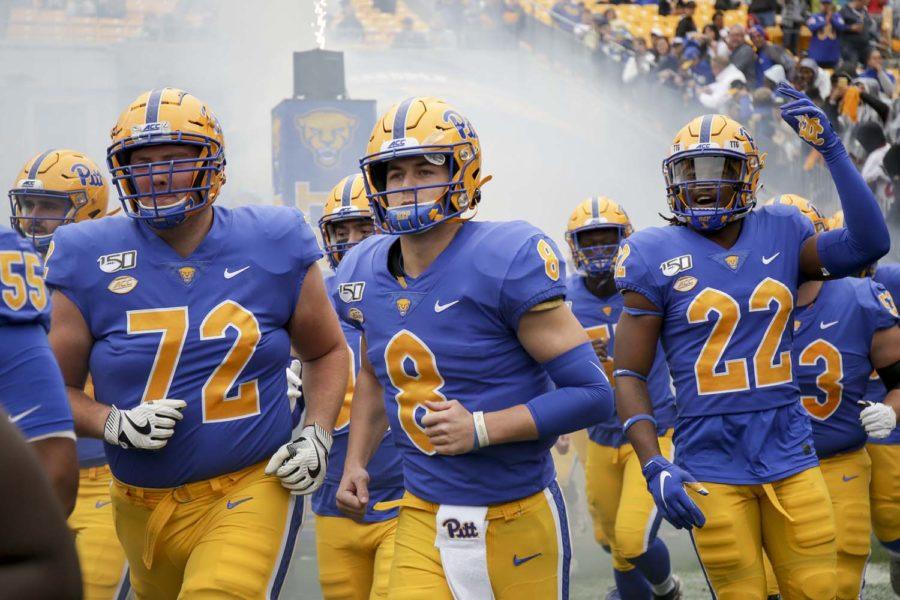Point-Counterpoint: Benefits will outweigh the consequences for college football this fall
Thomas Yang | Senior Staff Photographer
Due to COVID-19, a football season is questionable for the Panthers.
August 26, 2020
This column is part of a point-counterpoint series. To read the opposing view, click here.
Last time Pitt football held a season amid a pandemic, they went on to win the national championship. This year’s team may not reach the same heights as the 1918 Panthers — although there will be a lot less competition with other leagues cancelling their schedules — but there are still many reasons to play this season. Game-altering concessions must occur to pull it off, such as the absence of fans, but the benefits outweigh the compromises that must be made in what will be a year like no other.
Players have been given the freedom to opt out of the season if they don’t feel safe competing or if they are worried about the long-term health issues that COVID-19 can cause. This isn’t a perfect fix, though, because the coronavirus doesn’t care if the players aren’t scared of it — it can infect and hurt them all the same.
Those lasting effects, such as inflammation of the heart muscle, or myocarditis, and general organ damage due to blood clots, have been used for months to argue why the season isn’t worth the risk. But some health experts think those risks are overblown. Dr. Michael Ackerman, a genetic cardiologist from the Mayo Clinic, has downplayed the effects that COVID-19 can have on the heart, saying he would take it out of the safety discussion or at least “demote it to ingredient number 10.”
Overblown or not, it’s important to understand why that risk is worth taking. To do so, one must look to the issue that has been at the forefront of football at all levels for the past decade — concussions. Players know that playing football can cause concussions, which can lead to even worse health problems over time as a result of chronic traumatic encephalopathy — memory loss, depression, an inability to control their emotions and early-onset dementia — and continue to play in spite of that. Players have been able to answer that impossible question, whether their health or the game they love means more to them, for as long as football has been played. Why shouldn’t they be allowed to answer it once again?
With many professional sports leagues back in action, college sports can follow in their trial-and-error footsteps, hopefully with more success. The NHL and NBA have put together successful seasons, even with the coronavirus looming overhead, thanks to their reliance on a player bubble.
The NCAA hasn’t announced any plans like that, and a bubble isn’t feasible with dozens of college teams. Instead, they will follow in the footsteps of Major League Baseball, where geographically proximate teams have played each other to limit travel and the number of teams coming into contact with one another. The NCAA is having conference-only schedules in similar fashion.
The MLB was rather lax about enforcing social distancing rules at first, leading to outbreaks among the Miami Marlins and St. Louis Cardinals, among other teams. The NCAA has long been criticized for not giving players autonomy, however, and its current approach may be more helpful in this case, limiting potential exposure through more stringent policies.
The financial aspect of college football, like it or not, must be considered as well in this decision. Popular sports such as football and basketball draw millions in ticket and merchandise sales, not to mention broadcasting deals. Although college athletic programs are a relative cash cow, they’re also one of the first things to fall by the wayside in hard times.
Stanford University, facing budget cuts as a result of the COVID-19 pandemic, axed 11 varsity programs last month, and others may follow suit. Many other programs will be forced to do the same if they don’t play football, with over $4.1 billion in fiscal revenue on the line for Power Five conference teams.
A school with balanced books may be less likely to make gambles in the name of fiscal gain — gambles such as bringing students back to school as an excuse to charge full tuition.
In difficult times, there are no easy solutions, and a college football season in the middle of a pandemic is not without risks. With the professional leagues’ restarts as learning opportunities, however, a season can be held at diminished risk and give fans and players something to look forward to again.








